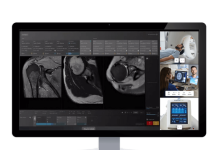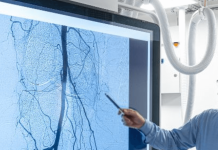Versius has been used to conduct more than 10,000 surgeries spanning 130 different procedure types across 7 surgical specialties including general surgery, thoracics, colorectal surgery, gynaecology, upper GI and urology
~ Almost 90% of CMR Surgical’s customer hospitals are using Versius across multiple departments; demonstrating the versatility of the system
CMR Surgical (CMR) – the global surgical robotics business – today announces that its next-generation surgical robotic system, Versius®, has been used to perform more than 10,000 soft tissue surgical cases in hospitals around the world. The surgical cases span 130 complex and benign procedure types across seven surgical specialties including colectomies, hysterectomies, hernia repairs and lobectomies.
Versius was developed to expand availability to minimal access surgery around the world. The system gained CE approval in 2019 and today there are over 100 Versius systems installed globally.
RRELATED: First patients treated in Kardium PULSAR IDE study of Globe pulsed field system
Professor Mario Nosotti, Director of the Department of Thoracic Surgery and Lung Transplantations of the Policlinico di Milano, a key institution using the Versius system, said: “We are pleased to have conducted complex clinical cases, across thoracic and general surgery including lobectomies and thymectomies. Having a versatile surgical robot that can be used across specialties has helped us to bring more minimally invasive surgery to patients in the Lombardia region. We hope this programme opens the door to a greater adoption of surgical robotics across the region.”
Dr Pradeep Chowbey is the Chairman, Max Institute of Laparoscopic, Robotic & Bariatric Surgery, Max Healthcare. He is a pioneer minimal access surgeon in the Asia Pacific region. He appreciated the potential of Versius, the next generation robotic platform and adopted it in 2021. He said: “With Versius we are able to deliver excellent clinical outcomes. Versius empowers us to operate with greater dexterity and precision. I continue using Versius in my everyday practice for common as well as advanced laparoscopic surgeries. The platform has a myriad of benefits, some of which include an open console and mobility of the system that enables it to be used across multiple specialities.”
The Versius system was designed with versatility in mind to support high utilisation in hospitals. The lightweight and portable design means that it can be shared between multiple hospital departments to increase utilisation and drive efficiencies. To date, a quarter of hospitals are using the system across seven major surgical specialties, and over 90% are using it in more than one specialty.
The small, modular form factor of Versius means it can fit into virtually any operating room, enabling a wider range of hospitals to start a robotics programme. Versius has enabled a number of hospitals to adopt a surgical robot for the first time, including Cristo Re Hospital in Italy and Klinikum Chemnitz in Germany, which required a versatile system capable of fitting into any operating room suitable for multi-specialty use.
Supratim Bose, Chief Executive Officer of CMR Surgical, comments: “Our mission is to help hospitals to deliver minimal access surgery to as many patients as possible, and I’m delighted to see us continue to make strong strides in our journey, having reached the milestone of over 10,000 patients treated using Versius. With Versius, the system can be used around the clock and around the hospital, enabling more hospitals to adopt surgical robotics programmes, providing greater access to minimal access surgery.”
Mark Slack, Chief Medical Officer of CMR Surgical, adds: “We launched Versius following the IDEAL framework, and along with the clinical registry we have a wealth of data that can support surgeons and hospitals to deliver the best care to their patients. We are proud that Versius has been used to help more than 10,000 people, with data showing that the use of the system is as safe as manual laparoscopy. The benefits of manual laparoscopy for patients are well-established and surgical robotics can help to enable more patients to benefit from this surgical technique. We look forward to working with more hospitals to increase access to surgical robotics.”
Clinical data from procedures is collected in the clinical registry giving surgeons and hospitals a wealth of information. CMR launched one of the world’s first clinical registries for surgical robotics as part of the Versius digital ecosystem, recording real world data from Versius procedures to ensure safety and help surgeons and hospitals to drive surgical standards.




